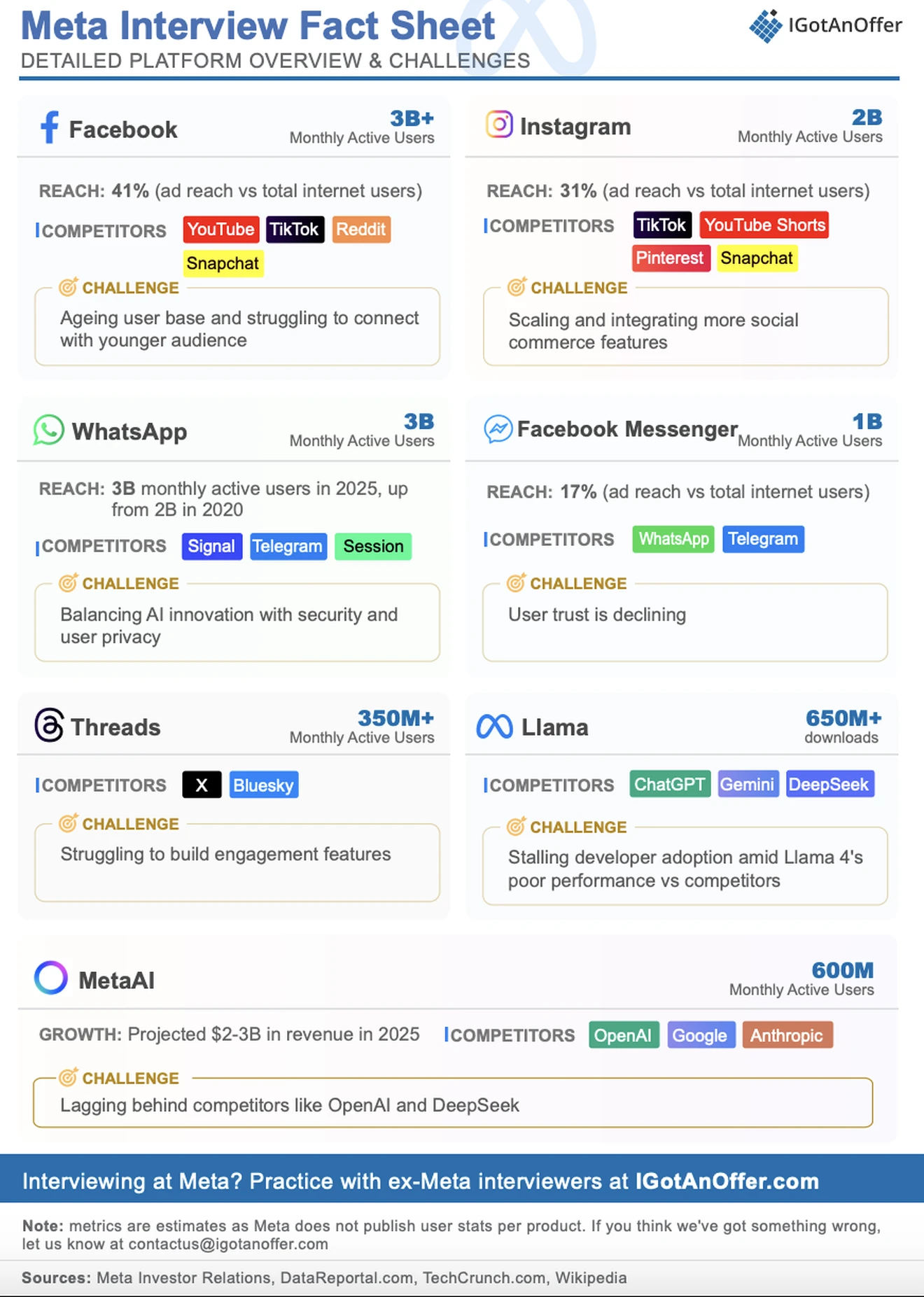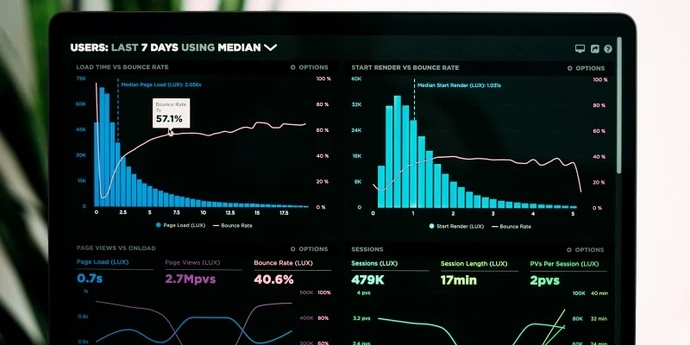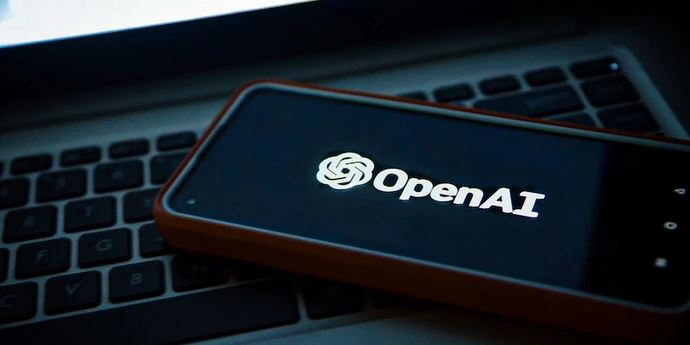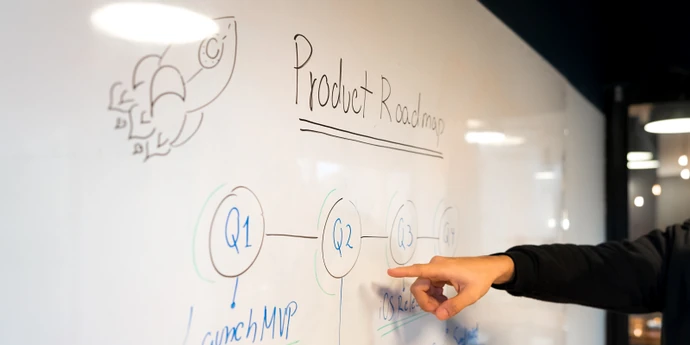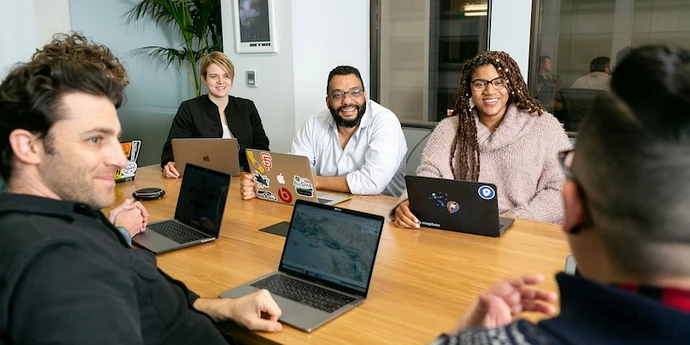If you're lucky enough to get into the Rotational Product Manager (RPM) program, it can be an incredible way to break-into into an exciting career. But if you want in, you're going to have to dig deep and prepare tenaciously for the Meta RPM interviews.
The interview process is tough, but don't be intimidated. If you learn the proper techniques and prepare accordingly, you can set yourself apart from other applicants and (hopefully) get the offer.
This guide contains everything you need to kick-start your preparation for the RPM interviews.
Here's what we'll cover:
- Meta RPM program overview
- Interview process and timeline
- Example questions
- Meta product interview grading rubrics
- Meta RPM interview FAQs
- Preparation tips
Click here to practice 1-on-1 with Meta ex-interviewers
1. Meta RPM program overview ↑
The Meta RPM (Rotational Product Manager) program is a full-time job consisting of three rotations, which provide exposure to a variety of product teams within the company.
It's highly competitive but is a great way to get into product management right at the top of the industry.
Check-out this 2-minute video below to see a nice introduction to the program. It's a few years old but still very relevant today.
1.1 RPM program basics
The RPM program lasts for 18-months, and includes the following elements:
- 1 month of product bootcamp training
- 16 months of rotations (3 rotations)
- 2 weeks for a global research trip
During the rotations, RPMs might work on product roadmaps, new product strategies, product design, metric selection, and more.
1.2 Who can apply
The RPM program is an entry-level PM role meant for applicants who are early in their careers, which includes recent graduates or candidates with a few years of experience.
Meta also recruits people from a variety of different backgrounds for RPM roles, so you should feel free to apply even if you don't have a PM or tech background.
1.3 RPM program locations
The primary locations for the RPM program are the following Meta offices:
- Menlo Park, California (headquarters)
- New York City, New York
- Seattle, Washington
- London, United Kingdom
And according to Parth Datroja, the location for a given RPM hire tends to be influenced by their level of experience.
More specifically, new graduates are usually brought into Meta headquarters in Menlo Park, whereas RPMs with more work experience are likely to be placed at one of the other locations.
1.4 RPM program perks
Meta's RPM program also has some really cool perks. Here are four that we think are particularly compelling:
- Launching pad for PM/tech career: Meta brings in entry-level candidates from a variety of backgrounds (not just engineers and developers) and gives them exposure to high-impact projects. So if you want to pursue a career in tech, the RPM program is one of the best launching pads you'll find.
- 6-figure salary: Meta pays their RPMs VERY well. You'll probably be making a salary of around $157K a year, depending on location and when you're hired.
- Research trip and community events: As part of the program, you'll also get to go on a 2-week research trip somewhere in the world. This could be a great opportunity to experience a new place for free. There are also ongoing events (including a holiday party) organized for RPMs and RPM alumni.
- The network: You'll be paired with at least 4 PM mentors during the program (your manager and a mentor on each of 3 high-impact projects), you'll get to know other RPMs, and you'll make connections in several different teams at Meta. That is an exceptionally good way to meet interesting people, and build relationships that could last your entire career.
Mentorship is such an important part of the RPM program, let's briefly touch on that topic in more detail.
1.5 RPM Mentorship
When they start, RPMs are paired with a single manager for the entire 18-month duration of the program. This provides a source of consistent, ongoing support throughout the program.
In addition to their manager, RPMs are paired with a mentor on each of their projects (rotations) who is an experienced PM at Meta.
At the peer level, RPMs can also learn from each other through RPM Circles, which are small groups that support one another during the program.
1.6 RPM program values
If you're really interested in becoming an RPM, then you're also going to need to know about Meta's values:
- Giving people a voice
- Building connection and community
- Serving everyone
- Keeping people safe and protecting privacy
- Promoting economic opportunity
A big point of emphasis for the program is the impact that RPMs can have right away. Meta has a huge user base, so the work of RPMs could end up impacting millions (or even billions) of people.
Meta is also using the RPM program as a talent development mechanism. They invest heavily in their RPMs and want them to learn, acquire new skills, and become the company's next wave of high-performers and leaders.
Finally, when you join the RPM program, you'll also be joining a community of other RPMs and RPM alumni. This can be a great way to make professional connections and even friends you'd hang out with outside of work.
Now that we've covered the basics of the RPM program, let's turn our focus to how you can get in!
2. Interview process and timeline ↑
It's important to know that the interview and application process for the Meta RPM program is similar to the process for other PM roles at Meta.
2.1 Timeline and interviews to expect
The end-to-end Meta interview process timeline for the RPM role is typically 6 - 12 weeks. This can vary by a couple of weeks depending on the situation, but that tends to be the timeframe. Here's a quick overview of what the timeline looks like:
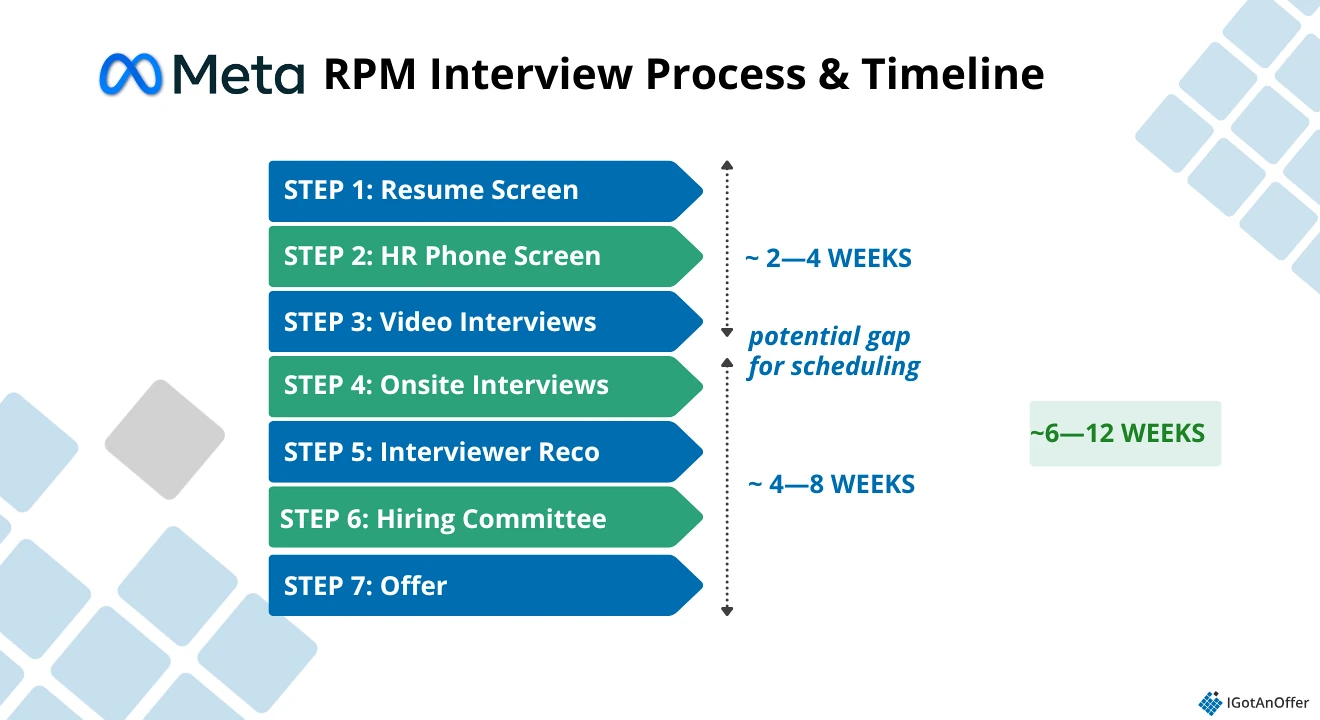
And of these stages, you should pay the closest attention to the first four:
- Stage 1: Resume, cover letter, and referrals
- Stage 2: HR phone screen: one interview
- Stage 3: PM video call: two interviews
- Stage 4: PM on-site: three interviews
Of course, getting your application is easier said than done, and your resume will need to be very strong. If you’re looking for expert feedback, you can also get input from our team of ex-Meta/Facebook recruiters, who will cover what achievements to focus on (or ignore), how to fine tune your bullet points, and more.
After your application is accepted (stage 1), you'll usually start your interview process by talking to an HR recruiter on the phone (stage 2). They are looking to confirm that you have a chance of getting the job, so be prepared to explain your background and why you’re a good fit for Meta
In the first interview, you should expect typical behavioral and resume questions like, "Tell me about yourself," "Why Meta?", "What do you value most about Meta?" or, "Tell me about a product you launched from start to finish."
If you get past the HR screen, the recruiter will then help schedule your first PM interviews (stage 3), which will be done on a video call like Zoom or Skype.
One great thing about interviewing at Meta is that they are very transparent about their recruiting process. Your HR contact will walk you through the types of questions interviewers will ask in subsequent rounds and they may also share this helpful Meta PM interview guide PDF with you.
After the initial HR phone screen, each of your subsequent PM interviews will take about 45 minutes and will follow one of three themes:
- Product sense, where you'll be tested on your product design and strategy skills
- Execution/analytical thinking, where you'll be tested on your data analysis and prioritization skills
- Leadership & drive, where you'll be asked to demonstrate that you are an empathetic leader
During your PM video call (stage 3 above) you will typically get one product sense and one execution/analytical thinking interview. And at the on-site interviews (stage 4 above), you will typically get one of each of the three types of interviews listed above.
For more information, also check out our Meta product manager interview guide.
2.2 What happens behind the scenes
Your recruiter is leading the process and taking you from one stage to the next. Here's what happens behind the scenes at each stage:
- After the PM video call (stage 3), the two interviewers you've talked to have 24h to submit their ratings and notes to the internal system. Your recruiter then reviews the feedback, and decides to move you to the on-site interview or not depending on how well you've done.
- After the onsite PM interview (stage 4), the three interviewers will make a recommendation on hiring you or not and the recruiter compiles your "packet" (interview feedback, resume, referrals, etc.). If they think you can get the job, they will present your case at the next hiring committee.
- The hiring committee includes senior leaders from across Meta. They will review your packet and make a final decision based on all the data points that have been collected about you in the process.
It's also important to note that hiring managers and people who refer you have little influence on the overall process. They might be able to help you get an interview at the beginning, but that's about it.
Now that we've covered an overview of the timeline and interview stages, let's dig into some example questions to help you get prepared!
3. Example questions ↑
There are three types of PM interviews you can expect at Meta: product sense, execution, and leadership & drive.
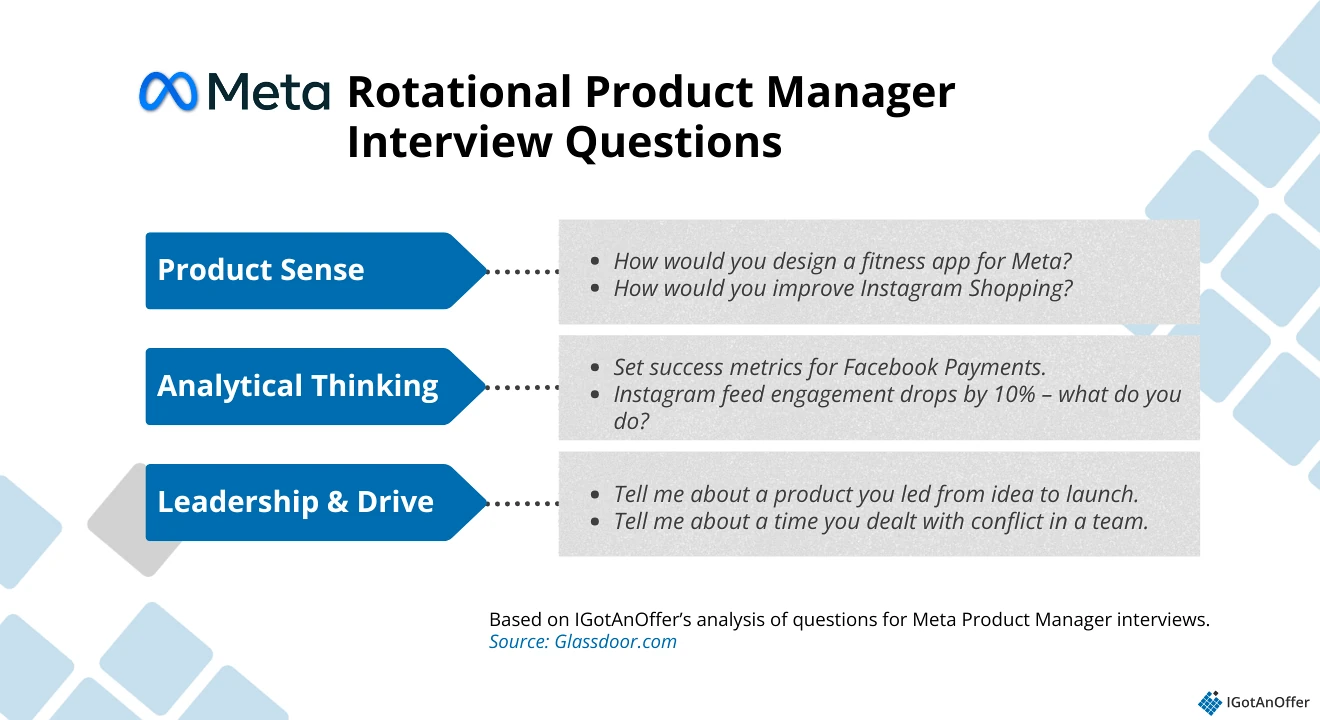
We've analyzed questions reported by former Meta PM candidates on Glassdoor and identified the top ten most frequently asked questions for each interview type. The results of this analysis are listed below.
Note: The questions below are taken from PM (not RPM) interview data, but as we mentioned earlier, the interviews for both roles are similar.
3.1 Product sense interview questions ↑
Meta RPMs decide what problems their teams work on and help design solutions for these problems. It's therefore important that they have strong product design and product strategy skills.
Karthik, a former Meta Senior Manager and interviewer, told us that they particularly like asking the favorite product question.
This is the part of the interview process where you should show that you're obsessed with the user. Here are a few of the skills Meta is looking for when asking product sense questions:
- How you identify who to build for and what their needs are
- How you focus on creating value and impact
- How you make intentional design choices
- How you handle critique, constraints, and new data
Below, we've listed the top ten product sense questions that Meta tends to ask, according to data from Glassdoor.
You may notice that these questions are a mix of product design, product improvement, and product strategy questions. We recommend studying the articles we've written on each topic to learn how to answer these questions in a structured and impactful way.
Top 10 product sense questions asked by Meta
- Design a fitness app for Meta.
- How would you improve Facebook Groups?
- Design an antiques marketplace for Facebook.
- Design a social travel product for Facebook.
- Design a jobs product for Meta.
- Design a product to help users find a doctor on Facebook.
- Facebook Events is struggling. How would you turn it around?
- Should Meta enter the dating / jobs market?
- How would you monetize Facebook marketplace / messenger?
- What should Meta do next?
"The main areas of focus are on product knowledge and creativity," says Karthik, former Meta interviewer. He lists four components that he says are key to giving a strong answer: "You need to structure your thought, drive in the right direction, create/add value, and show how you will measure success/failure."
For a closer look, check out our comprehensive Meta product sense interview guide.
3.2 Execution/analytical thinking interview questions ↑
Once an RPM has decided what problem to solve and what features to build, it's time to execute! Meta prides itself on being a data-driven organization so it's essential that you show you’re data-driven too.
This is the part of the interview to display that you have strong analytical and prioritization skills. Here are a few of the things Meta is looking for when asking execution questions:
- How you set the right goals for a product and measure against them
- How you identify, frame, and evaluate trade-offs
- How you analyze and debug problems
- How you set your team up for success
- How you overcome challenging situations in a well-thought-out way
Below, we've listed the top ten execution questions that Meta tends to ask, according to data from Glassdoor. Once again, it's a good idea to develop a framework to answer these questions.
Top 10 execution questions asked by Meta
- Prioritize WhatsApp Group Chat features.
- Newsfeed engagement drops 10%. What do you do?
- You are the PM for Facebook posts — what reactions should we add next?
- How would you set goals and measure success for Facebook Live?
- How would you set goals and measure success for Facebook notifications?
- How would you set goals and measure success for Instagram stories?
- Facebook Groups usage dropped 10% — what do you do?
- Facebook Ads revenue dropped 20% — what do you do?
- You are the PM for Facebook newsfeed — how would you rank posts?
- How would you evaluate a trade-off between boosting ad revenue and decreasing retention?
Once again, it's a good idea to develop a framework in answering these questions.
"For execution questions, the focus is on KPIs, metrics, and practical methodologies around executing the building of products. Use frameworks like GAME and Five Whys. Analyze the problem space, constraints and how to overcome them, and how to measure success," says Karthik, former Meta interviewer.
For more information, check out our article on how to ace the Meta execution interview.
3.3 Leadership & drive interview questions ↑
RPMs work with a variety of different people: engineers, designers, data analysts, etc. They need to be able to motivate their team, resolve conflicts, drive alignment, build relationships, and work with others.
This is the part of the interview where you really want to show that you've got drive and empathy. Here are a few of the skills that Meta is looking for during the leadership & drive interview:
- How you earn trust and take ownership
- How you process and grow from past experiences
- How you support the people around you and help build a team up
- How you promote a positive culture by coming up with new ideas and mentor people
- How you overcome difficult situations
Below, we've listed the top ten leadership & drive questions that Meta tends to ask, according to data from Glassdoor.
Top 10 leadership & drive questions asked by Meta
- Tell me about yourself.
- Why Meta?
- Why product management?
- What's a good PM / bad PM?
- Tell me about a product you led from idea to launch.
- Tell me about a time when you had to make a decision with incomplete information.
- Tell me about a time you overcame a really difficult challenge.
- Tell me about a time you managed a conflict / disagreement in a team.
- Tell me about a time you failed at work.
- Tell me about a time you led a team.
"Always tell stories from your own experience of how you took ownership and initiative, handled failure, built a team from scratch, and prioritized and handled conflicts," says Karthik, former Meta interviewer.
For more information, check out our leadership primer for tech interviews and articles on how to answer behavioral interview questions and the "Why Meta?" question.
4. Meta Product Interview Grading Rubrics ↑
At Meta, your performance is evaluated after EACH interview using a standardized product interview grading rubric. Noah, an ex-Meta product leader, shares a sneak peek of how Meta runs this process.
Interview format
A standard PM loop at Meta consists of five interviews:
- The first round includes one Product Sense and one Analytical Thinking interview
- If a candidate passes both, they move on to a repeat of round one (Product Sense round 2 and Analytical Thinking round 2), plus a Leadership and Drive interview
Learn more about these question types in Meta’s official PM interview loop guide.
Typically, within about 24 hours of each interview, the interviewer submits their feedback in Meta’s interview system. Note that there is no formal debrief after the loop, so interviewers cannot see what others have submitted until they submit their own feedback.
For each grading criterion, interviewers assign one of the following scores and include written feedback explaining their rating:
- Below Expectations
- Meets Expectations
- Strong
- Exceptional
- Unable to evaluate
Example evaluation criteria
FAANG companies, including Meta, are very secretive about the exact details of their interview grading rubrics. Below is an example set of evaluation criteria for Product Sense and Analytical Thinking (Product Execution) that Noah recommends PM candidates use to guide their prep.
You can use this sample rubric to identify potential gaps in your approach and improve your answers before the actual interviews.
Note that these are NOT Meta’s actual interview rubric, but a representative example based on Meta’s PM interview loop guide.
Product Sense
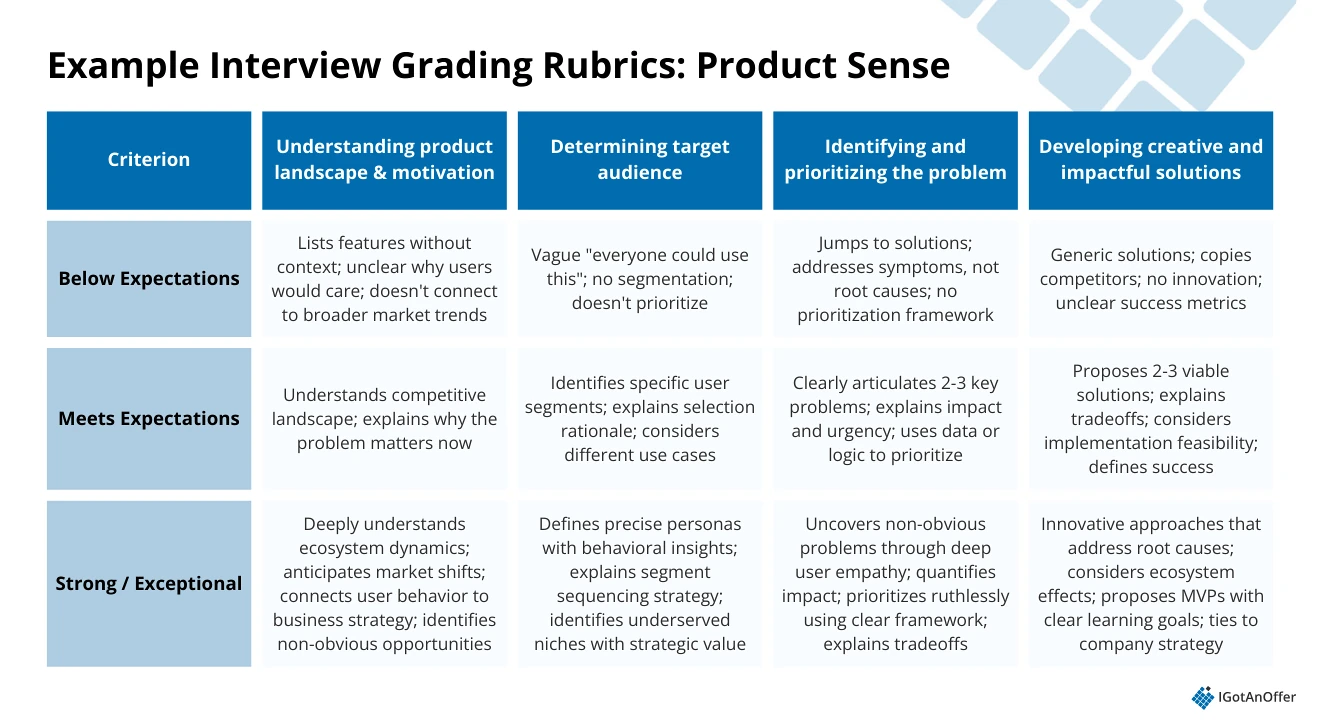
Analytical Thinking / Product Execution
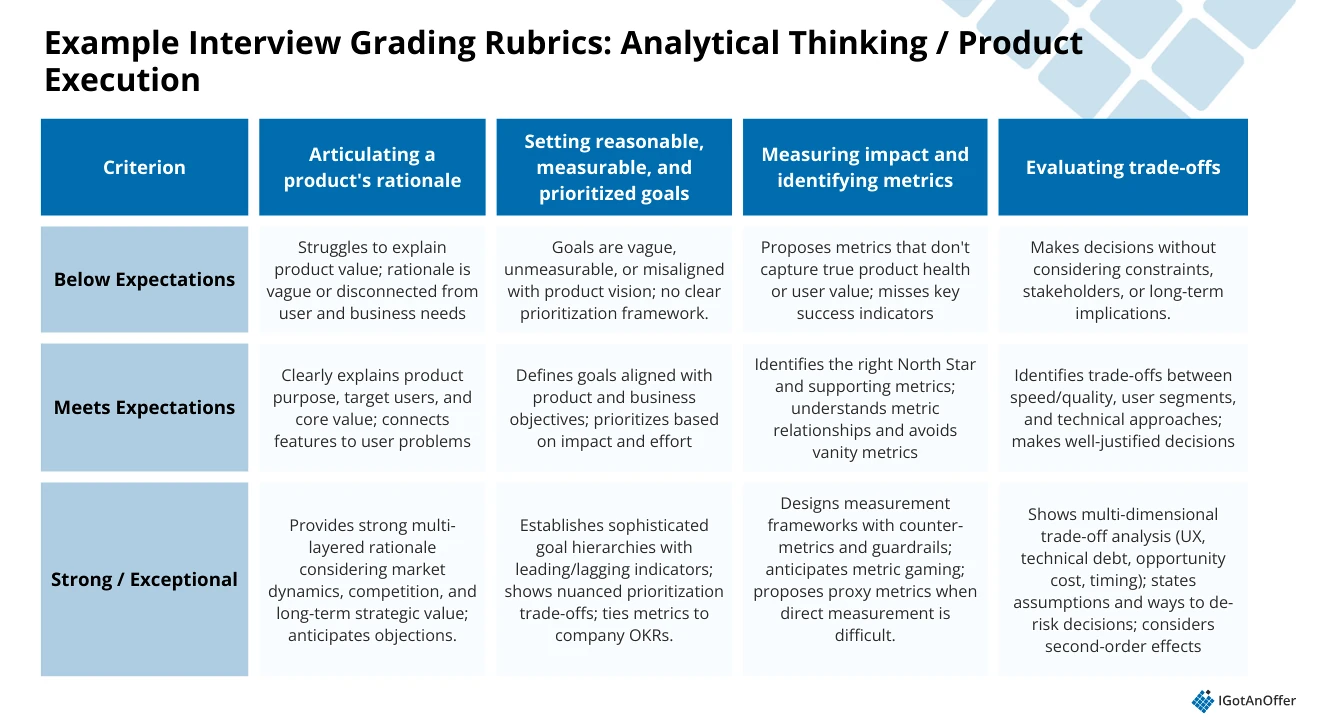
Click here to download the example PM interview grading rubrics (PDF)
In addition to the scores, interviewers also submit a summary note, such as “Soft no,” “Suggest re-evaluate,” or “Strong yes,” which can significantly influence the hiring decision.
Post-evaluation
Once all evaluations have been submitted, there are three possible outcomes:
- You move forward for approval if most interviewers recommend “Hire” or “Strong Hire”
- You may be asked to complete follow-up interviews if feedback is mixed or additional information is needed
- You are rejected if there are multiple “No hire” or “Strong no hire” recommendations
After the post-evaluation stage, candidates who pass the hiring committee move on to leveling and team matching.
5. Meta RPM interview FAQs ↑
Here are frequently asked questions about RPM interviews at Meta:
#What is the role of an RPM in Meta?
A Rotational Product Manager at Meta is groomed to become one of the company’s future product leaders.
If you are one of the successful candidates, the 18-month developmental RPM program will equip you with the skills and competencies to become an excellent product manager.
You will be expected to bring strong organizational and leadership skills as well as analytical and problem-solving skills to any project in the three rotations you will be assigned to.
Example rotations include growing Facebook Watch, launching WhatsApp Payments in Brazil, AR Commerce features, Oculus VR experiences, Instagram Stories, and Building Portal.
#How competitive is the Meta RPM program?
With around 97% of applicants not getting an interview, the Meta RPM program is very competitive.
Having a strong PM resume is the best way to increase your chances of getting an interview.
After you’re called for an interview, the next best way is to prepare well for the interview with guides like this and practice sessions with former Meta interviewers.
#What is the acceptance rate for Facebook/Meta RPM?
Less than 1% of applicants to the RPM program are finally accepted into the program. Meta screens around 8,000 to 10,000 applicants every year.
Since the RPM program doesn’t require candidates to have technical experience, you can’t rely on your technical skills and experience even if they’re strong. Your resume must stand out by marketing itself. Meta particularly looks for:
- Civic engagement, consulting, or founder backgrounds
- Projects you've participated in or run independently
- Skills and accomplishments that Facebook values such as product sense, analytical skills, data-driven decision-making, product management, and project management
Get your resume reviewed by former Meta managers to increase your chances of getting an interview at Meta.
6. Preparation tips ↑
Now that you know what questions to expect, let's focus on preparation.
Below, you’ll find links to free resources and five introductory steps to help you prepare for your Meta RPM interviews.
6.1 Deep dive into the product/organization
As you've probably figured out from the example questions listed above, you can't become an RPM at Meta without being familiar with the company's products and its organization. You'll, therefore, need to do some homework before your interviews.
Here are some resources to help you get started with this:
- Meta's 6 core values (by Meta)
- Facebook’s “hacker culture” (by Mark Zuckerberg, via Wired)
- Meta annual reports and strategy presentations (by Facebook)
- Facebook's approach to tech trends (by CB Insights)
- Meta org culture analysis (by Panmore Institute)
In addition, we’ve put together interview fact sheets that you can use during your prep. These provide a general understanding of Meta’s products and user base, areas interviewers often expect candidates to reference during interviews.
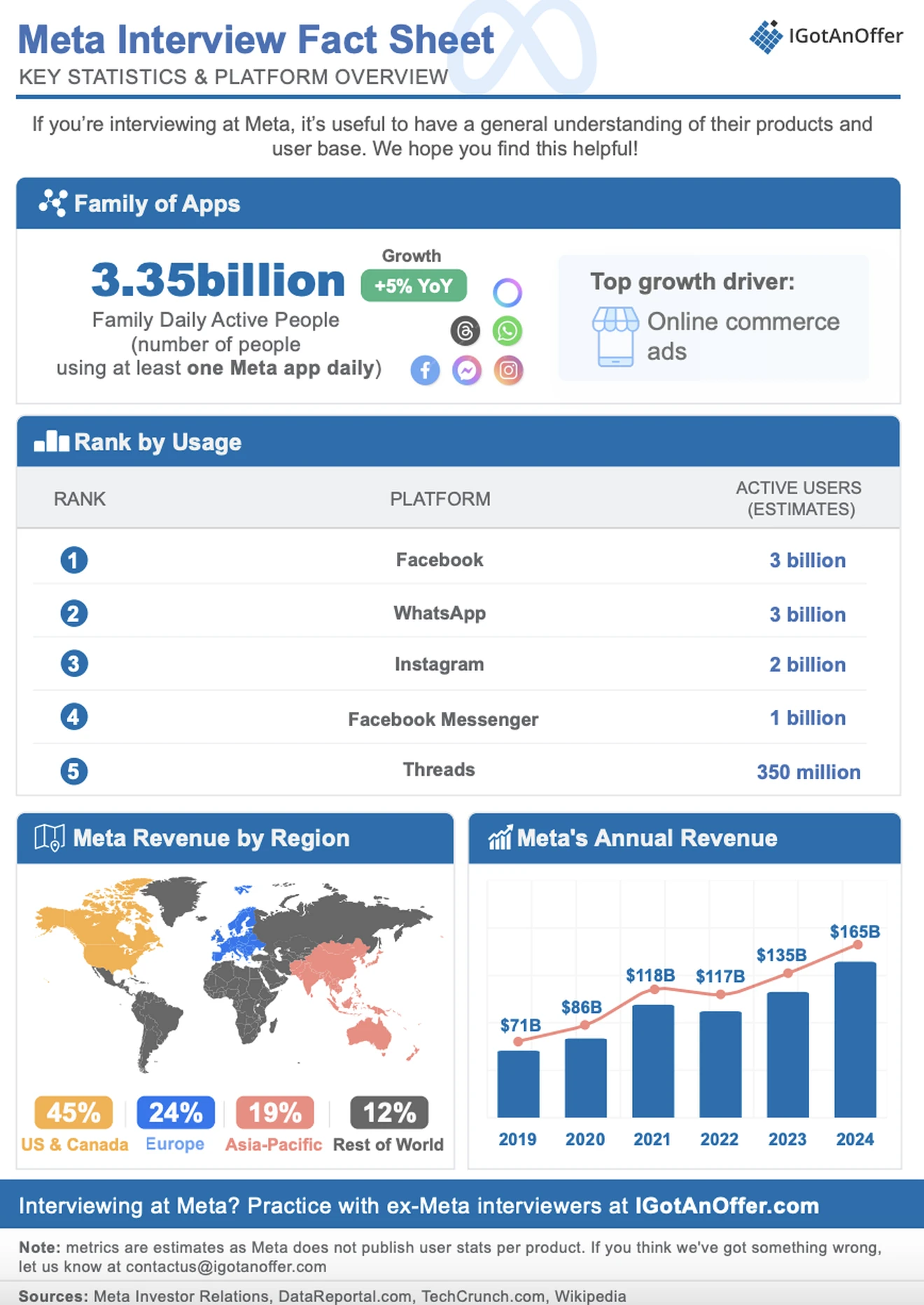
Click here to download the Meta interview fact sheets
6.2 Brush up on product fundamentals
It's also important to understand basic product management concepts. To help you expand your PM knowledge, check out this list of free resources as a starting point:
- Popular PM interview books reviewed (by IGotAnOffer)
- Product management guides (by Aha.io)
- What distinguishes the top 1% of product managers from the top 10%? (by Ian McAllister on Quora)
- What's something product managers know that others don't? (by Dan Schmidt on Quora)
- Product vs. feature teams (by Silicon Valley Product Group)
- Product requirements document example (by Product Hunt)
- Data-driven product management: Choosing the right metrics for your product (by productcoalition.com)
- How should product managers say no? (by productcoalition.com)
6.3 Learn a consistent method for answering PM interview questions
As mentioned previously, Meta will ask you questions that fall into certain categories like behavioral, design, strategy, estimation, and metric questions. Approaching each question with a predefined method will enable you to build strong interview habits.
Then, when it comes time for your interviews, these habits will reduce your stress and help you to make a great impression.
If you’re just looking for a jumping-off point, you can start learning about the different question types you’ll need to master in the following blog articles:
- Behavioral questions
- Product design questions
- Product improvement questions
- Favorite product question
- Strategy questions
- Estimation questions
- Metric questions
- Prioritization questions
Once you understand how to answer each question type, you also need to be able to communicate your answers clearly, under the pressure of interview conditions. That’s where practice comes into play.
6.4 Practice by yourself or with peers
In our experience, practicing by yourself is a great way to prepare for PM interviews. You can start practicing alone, asking and answering questions out loud, to help you get a feel for the different types of PM interview questions. It will help you perfect your step-by-step approach for each question type. And it also gives you time to correct your early mistakes.
You can find free practice questions on articles like this one or on YouTube.
If you have friends or peers who can do mock interviews with you, it’s worth trying. It’s free, but be warned, you may come up against the following problems:
- It’s hard to know if the feedback you get is accurate.
- They’re unlikely to have insider knowledge of interviews at your target company.
- On peer platforms, people often waste your time by not showing up.
For those reasons, many candidates skip peer mock interviews and go straight to mock interviews with an expert.
6.5 Practice with experienced PM interviewers
Finally, you should also try to practice product manager mock interviews with expert ex-interviewers, as they’ll be able to give you much more accurate feedback than friends and peers.
But for most of us, it's tough to find the right connections to make this happen. And it might also be difficult to practice multiple hours with that person unless you know them really well.
Here's the good news. We've already made the connections for you. We’ve created a coaching service where you can practice 1-on-1 with ex-interviewers from leading tech companies like Meta. In our experience, three or four coaching sessions worth ~$500 significantly impact your ability to land the job.







